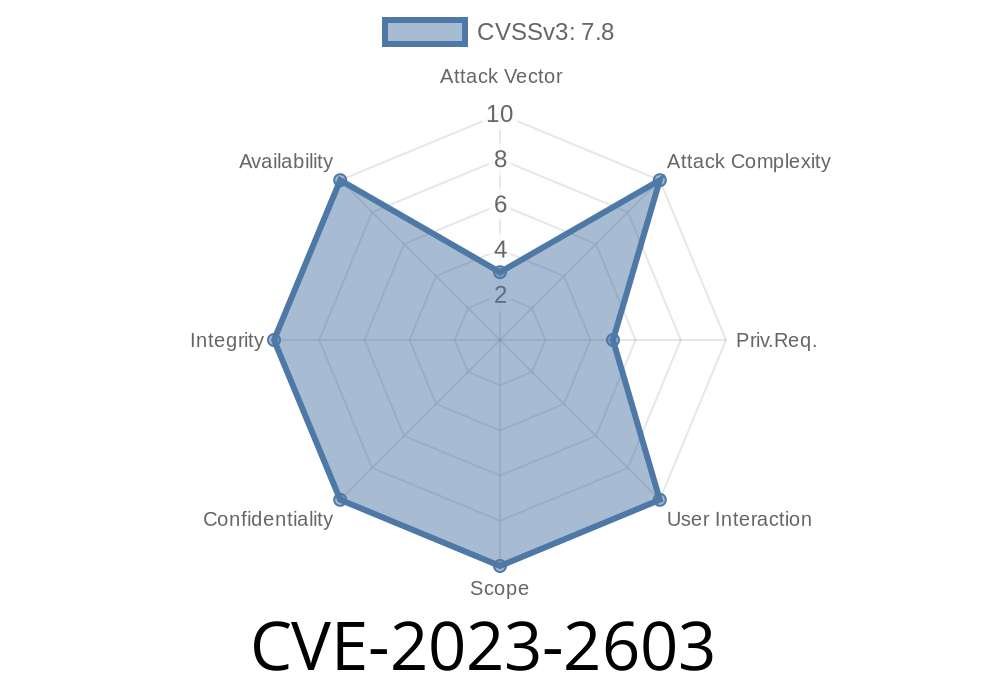In May 2023, a critical vulnerability tagged CVE-2023-2603 was uncovered in the popular libcap library. This bug lives in the low-level _libcap_strdup() function and can cause an integer overflow if an attacker provides a very large input string. While 4 GiB strings are rare in day-to-day apps, this flaw can become dangerous in certain edge cases where untrusted input is passed through the library. Let’s break down how this vulnerability works, walk through an example exploit, and see what the fix involves.
What is libcap?
libcap is a portable C library for userspace programs to handle POSIX.1e capabilities, usually installed with Linux distributions. It provides tools and APIs to manipulate file capabilities (think: fine-grained permissions for binaries).
A key utility in libcap is a custom string-duplication function, called _libcap_strdup()
static char *_libcap_strdup(const char *s)
{
char *c;
size_t l = strlen(s) + 1;
c = malloc(l);
if (!c)
return NULL;
memcpy(c, s, l);
return c;
}
The Trouble: Integer Overflows
For nearly all input, strlen(s) + 1 is a safe way to get buffer size. But if the input string is *almost* 4 GiB (near SIZE_MAX), then strlen(s) + 1 wraps around back to zero, or to a much smaller value than expected, because of integer overflow.
In C, this causes malloc() to reserve a far too-small buffer, yet memcpy() will still copy the huge 4 GiB-sized string—leading to a buffer overflow.
Example Exploitation: How Could It Be Attacked?
Suppose an attacker controls input that eventually reaches _libcap_strdup(). They send a string of (2^32 - 2) bytes (just shy of 4 GiB).
memcpy(c, s, l) now writes ~4 GiB into this tiny buffer. BOOM, buffer overflow!
If the attacker supplies this input to any affected program, they might overwrite memory arbitrarily, possibly running their own code. That leads to classic security impacts: *crashes, privilege escalation, remote code execution, etc.*
PoC (Proof-of-Concept) Snippet
Here’s a minimized demo in C, illustrating the vulnerable logic. *Don’t run destructive PoC on your main machine!*
#include <stdio.h>
#include <stdlib.h>
#include <string.h>
#include <stdint.h>
char *_libcap_strdup(const char *s) {
size_t l = strlen(s) + 1;
char *c = malloc(l);
if (!c)
return NULL;
memcpy(c, s, l);
return c;
}
int main() {
// Simulate a nearly-4GiB-long string (with malloc, not a real string—we’ll demo the math)
size_t len = UINT32_MAX - 1;
printf("Allocating: %zu bytes\n", len);
char *fake = malloc(len + 1);
if (!fake) {
printf("Allocation failed. Try on smaller input! (Or 64-bit OS, lots of RAM.)\n");
return ;
}
memset(fake, 'A', len);
fake[len] = '\';
// Vulnerable call
char *dup = _libcap_strdup(fake);
if (!dup)
printf("Duplication failed (probably allocation returned NULL)\n");
else
printf("Duplicated string (unexpected!)\n");
free(fake);
free(dup);
return ;
}
*Expected result:* Most systems will abort, or malloc() gives a tiny pointer, memcpy overflows, risking crash.
Real-world Impact
Any SUID program, container runtime, or utility using libcap and allowing untrusted strings could be a target. While feeding huge strings is impractical on lightweight systems, it's possible in cloud, server, or sandboxed environments where memory quotas are large.
A safe fix checks if the computed length overflows before calling malloc()
size_t len = strlen(s);
if (len == SIZE_MAX) {
/* Avoid integer overflow */
return NULL;
}
len++;
char *c = malloc(len);
Or, for maximum safety
if (len + 1 < len) { // Impossible unless overflow happened
return NULL;
}
libcap maintainers (fix commit) added such overflow checks and released a patched version. Everybody should update: as of libcap 2.69+, this is resolved.
References
- CVE entry (MITRE)
- libcap GitHub
- Commit with fix
- Debian Security Advisory
Final thoughts
CVE-2023-2603 is a reminder: integer overflows are subtle but deadly, especially with memory allocation. Even simple code using strlen + 1 isn’t always safe! If you use libcap, update it now—even small bugs can have large impacts, especially when dealing with permissions and security boundaries.
Is your software safe? Review your input handling and keep your dependencies patched!
*If you want to play with buffer overflows safely, explore C or Python in a sandbox, and never on production machines.*
Timeline
Published on: 06/06/2023 20:15:00 UTC
Last modified on: 06/21/2023 19:02:00 UTC
